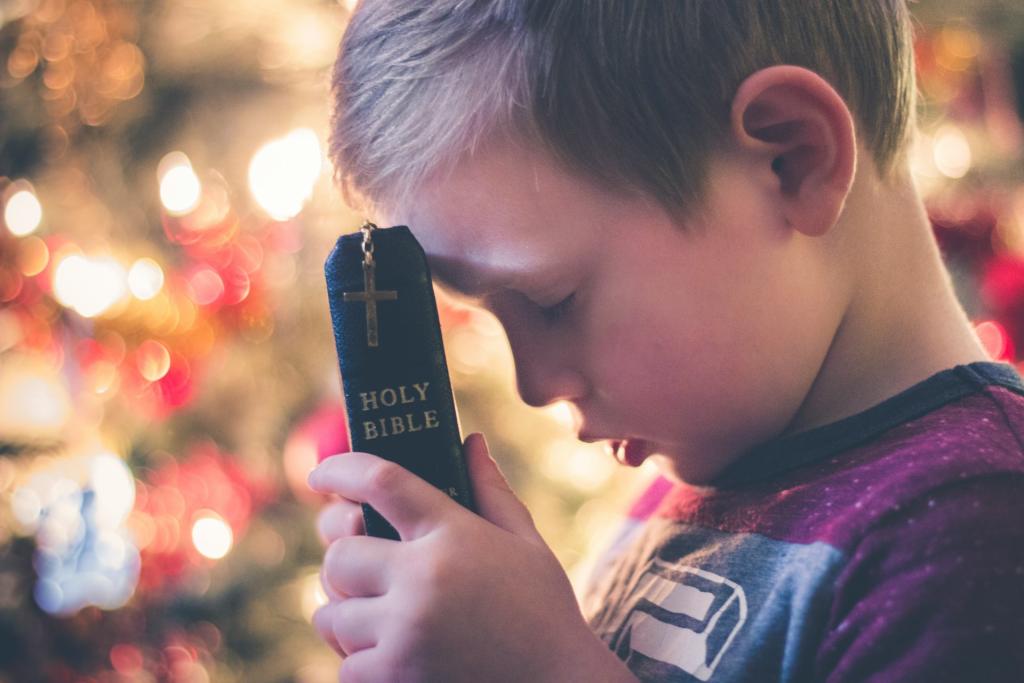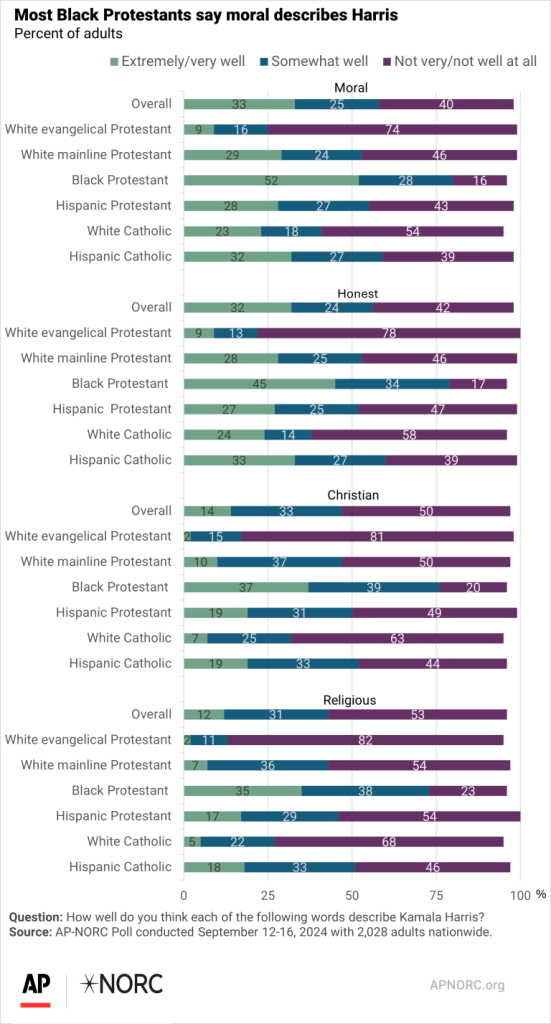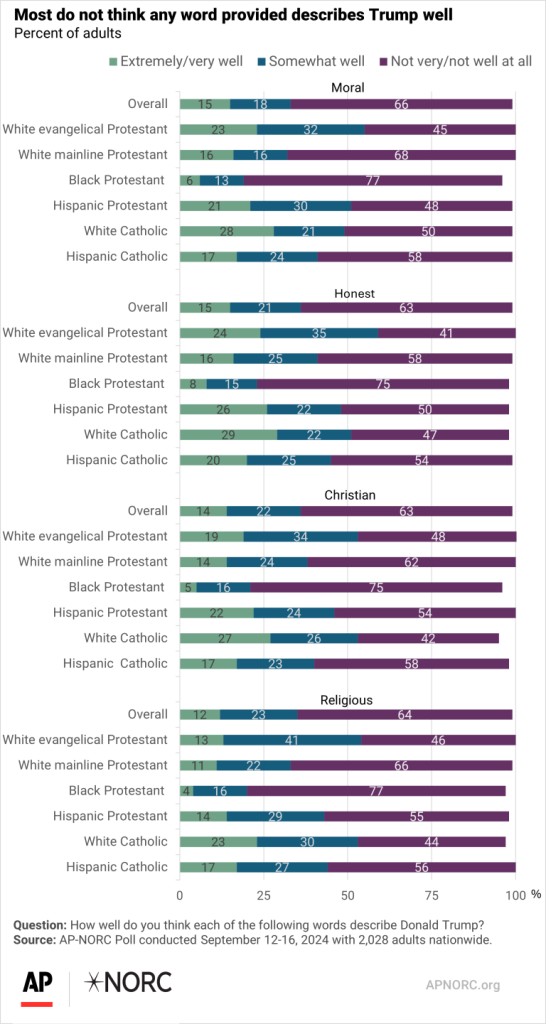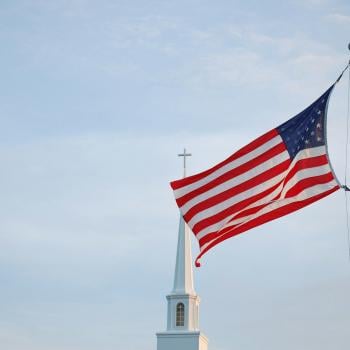Campaign rallies, donor stops, debates–all appealing to Christian values. That’s the heart of the presidential election and it will be beating loudly until November 6. Are you ready? If you took this recent national poll, you need a little more time. Last month, the Associated Press-NORC Center for Public Affairs found that only 14 percent of U.S. adults say the word “Christian” describes former President Donald Trump “extremely” or “very” well. And, it’s even less for Kamala Harris.
America isn’t terribly impressed with the living epistle aptitude of either candidate.
- 64 percent of adults said they don’t consider former president Donald Trump religious
- 53 percent said they don’t consider Kamala Harris religious.
- A plurality of Americans—41 percent—say neither Trump nor Harris represents their religious views.
It’s too late to go back to the polling place and the drawing board. Does the Body of Christ care about the person in the office? It doesn’t matter. We’re stuck with these two, so now what?
Before we delve into this question, do you want to stay in touch with the faith-based issues that hit close to home? Subscribe to our free newsletter and never miss what’s being said about the Church and what Christians can say back.
Should We Vote for Best or Stick with Christian Values?

It’s no secret that “MAGA Nation” is the coffee shop for ultra-conservative Christians. The question is what do they talk about when they are together? It seems a chat over strong coffee and a prune danish is not necessarily about the grace and goodness of God. The far left doesn’t escape the ire of those who believe Christians aren’t reflecting the Lord. Millions of Bible-toting and Jesus-loving people strongly believe in voting for Kamala Harris.
Politics is always polarizing. It’s been a divisive subject since folks first set foot in Jamestown, Virginia. These days, wearing a red or blue tie could be the catalyst for some strong fisticuffs in the wrong location. However, what America is seeing is that politics may no longer be about religion. At least, that’s not being witnessed in the lives of the two candidates, according to this AP-NORC poll.
In particular, the pollsters asked Americans what words they would use to describe each candidate. “Christian?” “Religious?” “Moral?” Maybe “Honest?” It depends who you ask and what color tie they wear.

Kamala Harris is considered a moral person who is honest among most voters except “white evangelical Protestants,” who frown upon the Democratic candidate.
- “Moral” — 74% say “not very.” Only 9% say “extremely.”
- “Honest” — 78% say “not very.” Again, 9% say “extremely.”
- “Christian” — 81% say “not very.” Just 2% say “extremely.”
- “Religious” — 82% say “not very.” And the same 2% say “extremely.”
Numbers seem to parse along ethnic lines as well with Black Protestants offering “extremely” ratings for each word almost double of Hispanic or White voters of the same denominational persuasion. That’s not to say Christians aren’t Democrats, but those who align with the stringent beliefs labeled as “ultra-conservative” or “far right,” are almost unanimously voting for Trump. That said, they aren’t exactly voting for Trump because of his righteous persona.

Using those same terms for Donald Trump didn’t help his reputation management, Despite the ethnicity or religion, the “overall” sentiment for each word was resoundingly negative–all majority numbers were “not very” or “not well at all.”
- “Moral” — 66%
- “Honest” — 63%
- “Christian” — 63%
- “Religious” — 64%
The largest group of polled participants–all consider themselves part of the Body of Christ–for a silent majority of people who don’t think too highly of the former president’s Christian values. Shouldn’t that be alarming? Are Christians simply voting based on party or a single divisive issue? If neither candidate best reflect your values and beliefs, how did they get this far in the first place? (And yes, if Biden was still gunning for the seat behind the Resolute Desk, the numbers would be similar.)
“They really don’t care about, is he religious or not,” said R. Marie Griffith, a religion and politics professor at Washington University in St. Louis, to the Associated Press. “Evangelical leaders are pushing this idea that, ‘This is God’s man, and we can’t ask why.’ We don’t have to ask why. It doesn’t matter if he’s moral, it doesn’t matter if he’s religious. It doesn’t matter if he lies compulsively. It’s for the greater good that we get him re-elected.”
Regardless what voters look like, where they are from, or what church they attend, one thing is for certain: The more things change, the more they stay the same. Unfortunately. Lord, hear our prayer.














